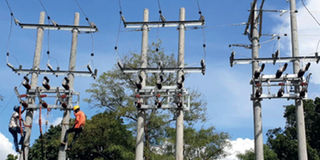Residents task govt to lower power connection fees

Residents task govt to lower power connection fees
What you need to know:
- The rural electrification scheme was commissioned by Energy minister Ruth Nankabirwa in the sub-counties of Kapeke, Nkandwa, Kyomya, Nakasozi, Gibiga and Lwamata
Local leaders and residents of Kiboga District have asked government to consider reducing the electricity connection fees to make it affordable.
Speaking at the commissioning of a rural electrification scheme in Lwamata Town Council last Friday, the people argued that many small scale businesses cannot afford the current connection fee of Shs730,000 charged by power distributor Umeme.
The chairperson for Nkandwa Sub-county, Mr Ahamad Kafeero, said reduction in the cost of connecting power will see more businesses, households, hospitals and schools get connected to the national grid, which will facilitate job creation.
“We commend the government for bringing power closer to the rural communities but the high connection fee is a challenge to rural households,” Mr Kafeero said.
The head teacher of Kapeke Seed Secondary School in Kapeke Sub-county, Rev Edward Musinguzi, said although the school was wired about a year ago, power had not yet been connected due to the high fees involved.
”We need power, especially in the computer laboratory so that students can research on different topics, besides, we have a boarding section. Students need light in the dormitories and classrooms where preps are conducted,” Rev Musinguzi said.
But the area Umeme principal engineer, Mr Magezi Nsamba, explained that for government-funded connections, inspection fee is Shs20,000, connection fee is Shs29,100 in addition to Shs9,100 for the metre with 10 units of Yaka.
He said the customer-funded connections are those that require Shs41,300 as inspection fee and Shs730,000 as connection fee.
The rural electrification scheme was commissioned by Energy minister Ruth Nankabirwa in the sub-counties of Kapeke, Nkandwa, Kyomya, Nakasozi, Gibiga and Lwamata.
The minister admitted that the high connectivity fee was a challenge to rural electricity users.
“While the grid has expanded, there is still a problem of affordability of connections, which the connections policy seeks to address. The policy faced lack of materials caused by bottlenecks created by Covid-19 that made it difficult to import materials. We are now back on track but starting with the backlog,” Ms Nankabirwa said.
She, however, said a World Bank project that would help address such challenges is in the offing.
The acting head of the Rural Electrification Agency, Mr Joan Kayaga Mutibwa, said in 2019, government secured a loan of $212 million from Exim Bank of China to connect major areas across the country. She said the project has since seen 150 schemes commissioned in the country.




